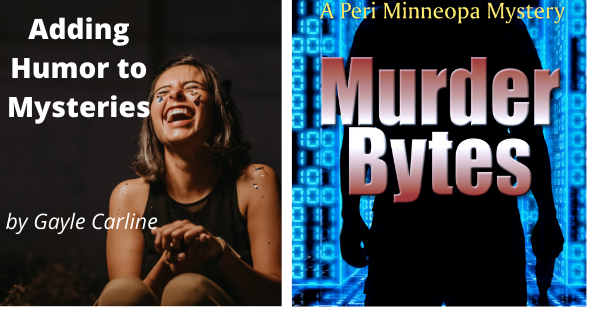
by Gayle Carline, @GayleCarline
I have a confession to make: My mysteries have humor in them—I just don’t advertise it. I don’t like to talk about my mysteries being funny because if a reader doesn’t laugh, they’re going to ignore whether it was a good story or not.
We do tend to throw the baby out with the bathwater.
Humor is highly subjective. We call it having a “sense of humor” because, just like our other senses, our likes and dislikes are unique to each one of us. I like asparagus. Why? I don’t know. You hate asparagus. Why? Same answer.
Our problem with humor is that we don’t have a common way to quantify our likes and dislikes. No one says, “Yes, I understand the point of the joke was that he was hit with a cream pie, but I’m not a fan of slapstick.”
They say, “I didn’t laugh, so it wasn’t funny.”
I do have some helpful hints for including humor in your mysteries (or romance, or whatever genre) that I can share. Full disclaimer: these are suggestions, not rules. As soon as someone labels something a rule, everyone comes out of the woodwork with a perfectly fabulous example of breaking the rules.
Also, your mileage may vary.
- If you’re truly writing genre, let the humor rise up organically. Don’t force the funny, and don’t try to get a laugh out of every chapter, every paragraph, even every sentence. I’ve read those books, and dear Lord, they’re exhausting. The mystery should, at its core, be about the mystery. If it’s not, call it a humor book.
- This might be my preference, but your characters should not find themselves hilarious. Think of Nick and Nora Charles—they are (to me) delightfully funny, but they do not laugh at their own jokes, or at each other’s, unless it is a single chortle. Even a half-chortle. A chort, if you will. Your character’s job is to be funny. Let the reader do the laughing.
- Break up your humor, visually, on the page. Give your reader the space to digest the scene, by making smaller paragraphs. This is akin to writing action scenes and getting the reader to focus on each punch. Most humor is a setup-punchline format. Consider setting your punchline in its own paragraph, even if it’s one sentence.
- If you want to advertise the humor, be specific. What kind of humor should the reader expect? Slapstick? Wisecracking dialogue? If you don’t know, find some writers with the same sense of humor and align yourself with them. In the style of Robert Benchley, this neo-noir mystery… (Actually, if any of you write that book, I want to read it.)
My final helpful hint applies to humor writing of any kind. Get yourself some steel wool and scrub yourself with it daily, because you’re going to need thick skin to release your humor to all those readers out there. If they are expecting erudite humor and get slapstick instead, they’re going to say you’re not funny. And if you don’t have the hide of a rhino, you might believe them.
What’s your favorite kind of funny?
 Gayle Carline spent almost 30 years as a software engineer until she chewed her way out of the cubicle to become a writer. She began with journalistic pieces for Riding Magazine, then graduated to humor columns in the Placentia News-Times, and the North Orange County News Tribune. But she wanted to write whodunits. She knew nothing of police procedures, but figured that reading her husband’s mind was good experience for writing mysteries. Most of her books are set in Orange County, where there are always good places to hide a body. When she’s not writing, Gayle spends time with her horses, her family, and her friends.
Gayle Carline spent almost 30 years as a software engineer until she chewed her way out of the cubicle to become a writer. She began with journalistic pieces for Riding Magazine, then graduated to humor columns in the Placentia News-Times, and the North Orange County News Tribune. But she wanted to write whodunits. She knew nothing of police procedures, but figured that reading her husband’s mind was good experience for writing mysteries. Most of her books are set in Orange County, where there are always good places to hide a body. When she’s not writing, Gayle spends time with her horses, her family, and her friends.
 Gayle’s latest book, Murder Bytes, is the fifth and final installment in her Peri Minneopa Mystery Series, featuring a 50-year-old housecleaner turned detective, and set in north Orange County. Murder Bytes is her 12th book, but she is planning to write many, many more.
Gayle’s latest book, Murder Bytes, is the fifth and final installment in her Peri Minneopa Mystery Series, featuring a 50-year-old housecleaner turned detective, and set in north Orange County. Murder Bytes is her 12th book, but she is planning to write many, many more.
Author @GayleCarline With 5 Tips for Adding Humor to Your Writing: Share on X
Let the chorts happen on their own!
And no, I don’t like asparagus.
I do love natural chorts. And it’s okay if you don’t like asparagus–that’s just more for me to enjoy!
Thanks for the post, Gayle! Great tips…especially not forcing humor. That’s never funny!
You’re so right! Humor really is subjective, isn’t it? It’s often hard to know what readers will find funny. And, yet, I know for myself, when I’m reading, I do like wit in a book; when it’s done well, it can be fantastic. Thanks for these ideas for thinking of the wit I put in my own books; it’s a dimension I hadn’t thought of, but definitely worth looking at more carefully.
Exactly, Margot! We can read a novel and think, “well, I’m more of a cozy reader, so this thriller isn’t as appealing,” but we don’t think, “yeah, I’m more New Yorker than Three Stooges, but the plot and characters are interesting.” Still, I hope you can push past that and insert a little of your natural charm and wit into your writing. Let’s face it–we all need more lightness and humor these days!
I’ve never attempted humor in my fiction. Maybe a little in my non-fiction though.
A little humor never hurts in a book–unless it’s a book on how to do brain surgery, I guess.
I thought I already replied, but it’s not showing up… forgive me if you get this twice.
A little humor is good for all of us, in fiction and nonfiction–unless it’s a book on how to do brain surgery?
I never thought of including humor with a mystery but it could add a dimension to the story. Thanks for the tips on how to do it right.
I actually teach a workshop in how to write humor at the Southern California Writers Conference, so I’ve been able to dissect how I manage to get a laugh (or a chuckle, or a chort) from my writing. I think if I wasn’t teaching it, I wouldn’t even think about it. Hope these are helpful!
I think a little humor added in a mystery is always good (if you don’t force the humor). As humans, we tend to smile or laugh no matter the situation. I think we need to find something to make us do that so that we can hand the bad stuff better. Great tips and a great couple as an example, Gayle. Wishing you much success.
Thanks, Mason! I think you’re right–I notice that in action movies, they tend to lighten things up with a wisecrack either just before or after a heavy dramatic scene. Sometimes I think the audience might explode from too much trauma if someone doesn’t say something funny, or at least wry. Have a great day, and I love your kitty profile pic!
Thank you SO MUCH, Elizabeth, for inviting me to your blog! It was a fun post to write, and I always enjoy sharing what I’ve learned with everyone else. I hope these hints are helpful!
I am just starting to explore adding “humor/comedy” label to my writing and this article made me consider closely why I was doing it and if it fit my objectives. Thank you for sharing your experience!
As long as your number one objective is to tell a damn, fine story, there’s always room for a little humor on the side.
Thank you, Gail! For me, the best tip here is “characters should not find themselves hilarious.” It’s the same as in real life–do you want to hang around the person who’s always laughing at their own “jokes,” or expecting others to? That’s not organic humor–that’s performing. For this reason, I’ve always hated dialogue tags like “he quipped” or “she cracked.” As soon as you tell me a character is trying to be funny, it falls flat.
Agreed, Bill. And I hate advertisements that guarantee this book/movie is so wacky/zany/uproarious (lord save me from those words), you’ll split your sides laughing. It’s like a dare to me. “Oh really? Make me.”